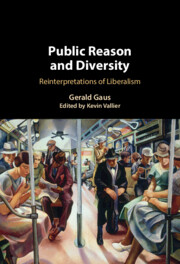Book contents
- Public Reason and Diversity
- Public Reason and Diversity
- Copyright page
- Contents
- Figures
- Tables
- A Note on the Essays
- Introduction
- Part I Liberalism
- Part II Diverse Public Reason
- Chapter 6 A Tale of Two Sets
- Chapter 7 Self-Organizing Moral Systems
- Chapter 8 Political Philosophy as the Study of Complex Normative Systems
- Index
- References
Chapter 8 - Political Philosophy as the Study of Complex Normative Systems
from Part II - Diverse Public Reason
Published online by Cambridge University Press: 18 October 2022
- Public Reason and Diversity
- Public Reason and Diversity
- Copyright page
- Contents
- Figures
- Tables
- A Note on the Essays
- Introduction
- Part I Liberalism
- Part II Diverse Public Reason
- Chapter 6 A Tale of Two Sets
- Chapter 7 Self-Organizing Moral Systems
- Chapter 8 Political Philosophy as the Study of Complex Normative Systems
- Index
- References
Summary
It is an honor and a treat when innovative social theorists and philosophers take time out of their important work to think about one’s own. The set of papers being published in COSMOS + TAXIS are especially flattering. Fred D’Agostino, Blain Neufeld, Scott E. Page, Kevin Vallier, Lori Watson and David Wiens all constructively engage The Tyranny of the Ideal and open up new issues to be explored. I am especially grateful to Ryan Muldoon for organizing this symposium (and, I should say, for all his work from which I have learned so much). I am also delighted that the symposium appears in COSMOS + TAXIS because the main theme of the book, which I hope to emphasize here (and which D’Agostino and Page bring out wonderfully in their essays) is that the subject matter of social philosophy is complex systems, something Hayek (1964 [2014], chap. 9) was one of the first to stress. Until, as Page puts it, “the imperative of complexity” is appreciated by political philosophers their work will remain what Hayek warned against – constructivist fantasies in which the critical problems of evaluative diversity, path-dependency, uncertainty, and interconnectedness are assumed away.
- Type
- Chapter
- Information
- Public Reason and DiversityReinterpretations of Liberalism, pp. 237 - 265Publisher: Cambridge University PressPrint publication year: 2022



